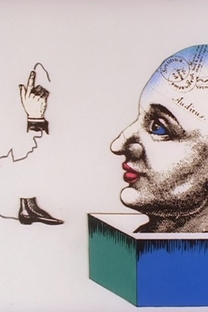Music by Toru Takemitsu
".... Freud would have had a field day with the animated shorts of the grandfather / bad boy of Japanese alternative animation Yōji Kuri (久里洋二, b. 1928). His black, and often bawdy, sense of humour pervades the mood of most of his films. In his 1963 film Love (愛, 1963), a big woman with prominent breasts breathily gasps the word “Ai” (Love) repeatedly as she chases a man who is much smaller than her. The woman is depicted as being so desperate for love that she even embraces trees in frustration. In contrast, the man seems repulsed by her attention and races to keep himself out of her clutches.
"In one moment, the woman clutches the man as if he were an infant or a ragdoll and he transforms into a giant drop of water in order to slip from her grasp and escape. The man also chants the word “Ai” but in a less passionate, more matter-of-fact manner. The couple play a kind of hide-and-go-seek amongst a row of trees. The woman chases the man with a net as if he were a butterfly. Once captured, she consumes him whole, only to have him come out the other end and escape again.
"She chases him through a gallery lined with portraits of the man and through an empty café with identical tables. Their chants of “Ai” are sometimes whispered, sometimes shouted at top volume, increasing in tempo and desperation. The woman’s arms stretch out to an impossible length in order to grab the man again. In another scene, he stands on all fours like a doll on a leash and eats his food on the floor.
"The chase grows increasingly desperate with the woman beating the man into submission with a baseball bat, reducing him to a stuttering idiot in their shared bed, and putting a leash on him and taking him on a walk. The ends with the soundtrack fading out as the man leads the woman into the horizon like a dog on a leash.
:This animated short is based on a poem by Shuntarō Tanikawa (谷川 俊太郎, b. 1931) with music composed by Tōru Takemitsu (武満 徹, 1930-96). Takemitsu is perhaps best remembered today for his composition of soundtracks for the films of great directors like Akira Kurosawa (Ran, Dosdesukaden), Hiroshi Teshigahara (Pitfall, Woman in the Dunes), and Masaki Kobayashi (Harakiri, Kaidan, Samurai Rebellion) and for his significant contributions to aesthetics and music theory. I am a fan of Takemitsu’s early experimental period, and his anti-academic Jikken Kōbō (experimental workshop) had a profound impact on the animator Yōji Kuri, who has used experimental composers like Takemitsu extensively in his films.
"The soundtrack of Love does not fall into the category of “music” in the classical sense, but in the postmodern sense of creating music using unconventional techniques and instruments. The recorded voices (H. Mizushima and Kyōko Kishida) have been distorted using a synthesizer. Sometimes the voices draw out, like a record playing at the wrong speed, or at other times they playback at pitches impossible for the human voice to attain. The tempo and volume is varied in order to create tension."
"Yōji Kuri is an animation artist most known for his work during the 1960's and is known to be of large importance to the history of animation. Known to be dark humored, independent and minimal artist, his work seems to capture a disturbing perspective of love and sex. Some such films as Human Zoo (1960) and Ai-Love (1963) depict this type of imagery and end fairly quickly. The time range for Kuri's work seems to be shorter then ten minutes, perhaps implying the shorts are more of a thought then a statement. He later produced an animation film The Bathroom (1970), it too was along the same subject matter as previous work. One part of the film at the end depicts butt and leg sculptures; the style and location (bathroom) reminded me of the TV show Shin Chan. Shin, a 5 year old boy whom is obsessed with human privates, frequently flaunts his rear and enjoys time in the bathroom.
Yōji Kuri continues to draw today as well as teach animation at the Laputa Art Animation School."
- animation blog at School of the Museum of Fine Arts, Boston
Yōji Kuri continues to draw today as well as teach animation at the Laputa Art Animation School."
- animation blog at School of the Museum of Fine Arts, Boston
"Kuri’s films have bite and he helped lift Japanese animation out of decades of cozy narrative cartoons into a new era of graphic and conceptual experimentation. His films mock and shock, attacking technology, population expansion, monotony of modern society while playfully toiling with the tricky goings-on between guys and gals. Witnessing the surrender of Japan during WW2, the devastation of his country followed by the quick rise of Western inspired materialist culture and rampant consumption, Kuri, like many of his colleagues of the time, questioned the state and direction of his society and world. One of his more experimental, stream of consciousness works is AOS (1964). Working with a vocal composition by Yoko Ono, Kuri takes the avant-garde artist’s assorted screams, moans, licks, and grunts and twisted them into a haunting and surreal series of black and white scenarios often involving discombobulated body parts of frustrated and repressed men and women who exist in cramped, isolated trappings – desperate but unable to connect or touch the other" - Chris Robinson, Animation World

